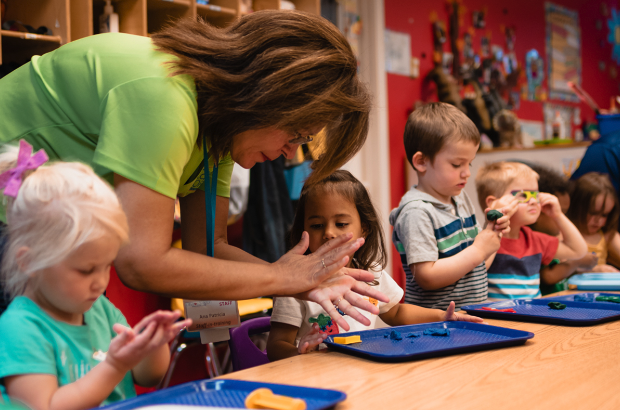Early childhood education (ECE) is a crucial phase in a child's development, laying the foundation for lifelong learning, behavior, and health. It encompasses the period from birth to eight years old, during which the brain undergoes significant growth and development. Understanding the importance of ECE and its impact on individuals and society can help in advocating for better educational policies and practices.
The Foundation of Cognitive Development
Brain Development: During early childhood, the brain develops rapidly, forming neural connections at a rate that will never be matched again. This period is vital for cognitive skills such as memory, problem-solving, and language acquisition. High-quality early education stimulates brain development and helps children achieve their full intellectual potential.
Learning through Play: Play-based learning is a core component of ECE. Through play, children develop critical thinking skills, creativity, and social competence. Activities like building blocks, storytelling, and interactive games enhance cognitive abilities and prepare children for formal education.
Social and Emotional Growth
Emotional Intelligence: Early childhood education programs emphasize the development of emotional intelligence, teaching children to recognize and manage their emotions. This includes understanding feelings, developing empathy, and learning conflict resolution skills. Emotional intelligence is crucial for building healthy relationships and succeeding in a social environment.
Social Skills: ECE provides a structured environment where children learn to interact with their peers and adults outside their family. They learn cooperation, sharing, and communication skills, which are essential for social integration and success in later life. These skills help children navigate social settings and build strong interpersonal relationships.
Long-Term Educational Benefits
School Readiness: Children who participate in quality early childhood education are better prepared for school. They tend to have higher literacy and numeracy skills, making the transition to formal schooling smoother. School readiness includes not only academic skills but also the ability to follow instructions, stay focused, and adapt to a structured environment.
Academic Achievement: Research shows that children who attend early childhood education programs perform better academically throughout their schooling years. They are more likely to complete high school, pursue higher education, and achieve better grades. ECE sets a strong academic foundation that supports lifelong learning.
Economic and Societal Impact
Reduced Inequality: Early childhood education plays a significant role in reducing educational and social inequalities. Children from disadvantaged backgrounds particularly benefit from access to quality ECE, which can bridge gaps caused by socio-economic disparities. By leveling the playing field, ECE promotes equal opportunities for all children.
Economic Returns: Investing in early childhood education yields substantial economic benefits. Studies have shown that every dollar spent on ECE results in significant savings in future educational costs, reduced need for social services, and lower crime rates. Additionally, ECE contributes to a more skilled and productive workforce, driving economic growth.
Health and Well-being
Physical Development: ECE programs often include activities that promote physical development. Regular physical activity helps children develop motor skills, coordination, and overall health. Nutritious meals and health education provided in these programs also contribute to children's physical well-being.
Mental Health: Early childhood education supports mental health by creating a stable and nurturing environment. Children learn coping mechanisms and stress management skills, reducing the risk of mental health issues later in life. Positive early experiences build resilience and foster a sense of security and self-worth.
The Role of Educators and Caregivers
Qualified Educators: The quality of early childhood education largely depends on the educators. Qualified and well-trained teachers can create engaging, supportive, and developmentally appropriate learning environments. Continuous professional development for educators ensures they stay updated with the latest research and teaching strategies.
Parental Involvement: Parents and caregivers play a crucial role in early childhood education. Collaboration between educators and parents enhances the learning experience, providing consistency and reinforcement of skills learned in the classroom. Parental involvement includes activities like reading at home, participating in school events, and maintaining open communication with teachers.
Challenges and Opportunities
Access and Affordability: Despite the proven benefits of early childhood education, access and affordability remain significant challenges. Many families, especially those in low-income communities, struggle to afford quality ECE programs. Addressing these barriers through public funding and policy changes is essential to ensure all children can benefit from early education.
Quality Standards: Maintaining high-quality standards in ECE programs is crucial. This includes appropriate teacher-to-child ratios, safe and stimulating learning environments, and evidence-based curricula. Regular assessment and improvement of ECE programs help maintain these standards and ensure effective outcomes.
Conclusion
Early childhood education is a pivotal stage in a child's development, with far-reaching impacts on cognitive, social, and emotional growth. It prepares children for future academic success, promotes equality, and contributes to economic and societal well-being. Investing in quality ECE programs and addressing challenges related to access and affordability are essential steps toward nurturing a generation of capable, resilient, and thriving individuals. By recognizing the importance of early childhood education, we can build a brighter future for all children.



add comment
please login to add or edit your comment
login nowpost comments
no comments added yet!